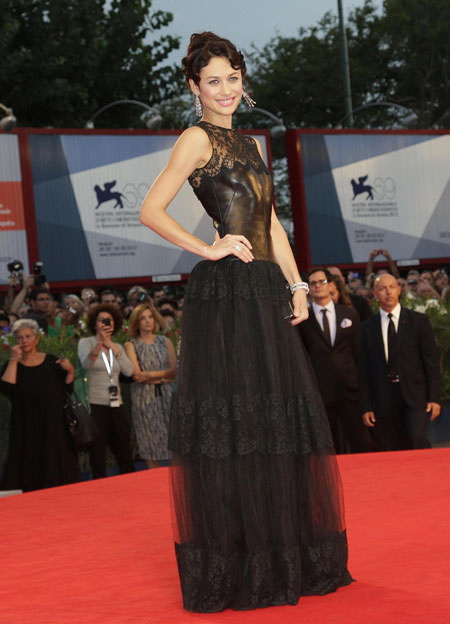Love him or loathe him?
Updated: 2012-09-03 10:01
(Agencies)
|
|||||||||||
 |
|
Actress Olga Kurylenko poses on the red carpet during a screening for the movie "To the Wonder" at the 69th Venice Film Festival September 2, 2012.[Photo/Agencies] |
Terrence Malick divides opinion like almost no other director working today, and "To the Wonder", his impressionistic and virtually dialogue-free story of love and faith, was booed as loudly as it was cheered at the Venice film festival on Sunday.
The movie is the reclusive American director's second in two years, after "The Tree of Life" won the Palme d'Or for best picture at the 2011 Cannes film festival.
To the Wonder is competing for the equivalent prize in Venice, the Golden Lion, as one of 18 main competition entries, although if it emerges victorious at the closing ceremony on Saturday it would be a major surprise.
The publicity-shy Malick was not in Venice to promote his movie ahead of its red carpet world premiere, but more surprisingly the only lead actor in Italy for interviews and photoshoots was Olga Kurylenko.
Co-stars Ben Affleck, Rachel McAdams and Javier Bardem did not make the trip, adding to a sense of anti-climax surrounding one of the most eagerly-anticipated titles of the festival.
To the Wonder centers around Affleck and Kurylenko, the Ukraine-born actress until now best known as Camille in Bond film "Quantum of Solace", as a couple deeply in love yet unable to live together.
She leaves Paris for a small town in the United States, and after struggling to adapt to her new life, decides to return to France. Affleck's character has an affair with an old friend, played by McAdams, before his first flame returns.
Spanish actor Bardem appears as a troubled priest facing a crisis of faith, extending the plot into the realm of the spiritual from the physical and emotional.
VOICEOVERS, PIROUETTES
The most controversial aspect of To the Wonder is not the plot, however.
With only a few words of dialogue, it is voiced over by the characters uttering phrases like: "The world so far away, a ghost, ashes," and "Love makes us one, two, one."
Affleck is virtually emotionless, the camera circles its subjects, there are many close-up facial images shot into the sunlight, and characters dance, prance and twirl their way across fields, parks and gardens.
Early reviews were mixed.
"However accomplished Malick's technique might be in some ways, this mostly comes off, especially in the laborious second hour, as visual doodling without focused thematic goals," wrote Todd McCarthy in The Hollywood Reporter.
"Currently without a distributor domestically, this ultimately enervating film will have trouble rustling up audiences in any market."
But publication Variety called it "ravishing" and "from a filmmaker who hasn't lost his capacity to move and surprise".
Malick may not care too much about what the critics say. According to his producer Sarah Green, who was in Venice, he does not read reviews and is too busy making movies.
The world had to wait 20 years between his 1978 movie "Days of Heaven" and "The Thin Red Line", and he has still only released six feature films in nearly 40 years, adding to the mystique surrounding the 68-year-old.
"No he's not here," Green told a news conference, when asked whether he was in Venice incognito.
"He's buried in work right now. He's on a creative roll as some of you may have heard. We've just finished shooting another movie, we're about to start another one. He's having a very exciting time creatively."
The British press has focused on Malick's decision to leave footage of Rachel Weisz on the cutting room floor, a fate that several leading actors have suffered at his hands.
"It seems that my part has been cut, so I had the experience of working with him but I will not have the pleasure of seeing my work," Italian newspaper La Stampa quoted her as saying.
Related Stories
Cast members promote 'Iceman' in Venice 2012-08-31 10:25
Michael Shannon darkens 'Iceman' role 2012-08-31 10:25
'Tai Chi 0' in Venice 2012-08-30 13:56
Venice Film Festival opens with 9/11 film 2012-08-30 13:22
Hudson, Watts promote 'Reluctant Fundamentalist' in Venice 2012-08-30 09:20
Diminished Chinese presence in Venice 2012-08-29 13:34
Today's Top News
President Xi confident in recovery from quake
H7N9 update: 104 cases, 21 deaths
Telecom workers restore links
Coal mine blast kills 18 in Jilin
Intl scholarship puts China on the map
More bird flu patients discharged
Gold loses sheen, but still a safe bet
US 'turns blind eye to human rights'
Hot Topics
Lunar probe , China growth forecasts, Emission rules get tougher, China seen through 'colored lens', International board,
Editor's Picks

|

|

|

|

|

|





